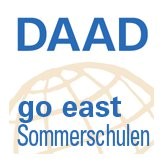XVII International Summer University at DKU in Almaty from 03 to 15 August 2020
Between tension and cooperation: Central Asia, EU and the «Belt and Road» Initiative
The next Summer University 2020 situates the region of Central Asia in the complex web of relationships between the EU, Russia and China and it titled «Between tension and cooperation: Central Asia, EU and the „Belt and Road“ Initiative». The debate on recent initiatives by China, Russia and the EU in and for Central Asia is currently at a peak and the selection of this issue appears timely.
The latest initiative of China «One Belt — One Road» (now simply referred to as «Belt and Road»), which Xi Jinping presented after taking office in 2013 provides the establishment of a new transport network through Central Asia and Europe, which China, like famous Silk Road in the early Middle Ages connected Asia, and Europe. The EU sees China's initiatives in the region as a challenge to its relationships with Central Asian states. After all, the EU has been the No. 1 trading partner for Central Asia, and came in to the region even before China and Russia. With the new Silk Road initiative, this balance might be under the threat to the EU's disadvantage. In this context, the new EU strategy for Central Asia («The EU and Central Asia: New Opportunities for a Stronger Partnership»), which was adopted on 1 June 2019, is increasingly seen as a counter-reaction by the EU to the Chinese «One Belt — One Road» initiative and China's growing presence in the region.
China, Russia and the EU vis-à-vis Central Asia thus represents the central thematic block of the planned summer university at the Kazakh-German University. Within the framework of one module, the Summer University is to be inter- and cross-disciplinary contribution to the current discourse on the advantages and disadvantages of international commitments in and for Central Asia. The main issues covered in the next Summer School include but not limited to interests, instruments, limits of influence of the EU in Central Asia; normative foundations of the EU's international engagement; China and Russia's engagement in Central Asia; past and new strategies of the EU toward Central Asia; ups and downs of EU's democracy promotion in Central Asia.
The planned Summer University will last full 14 days. An intensive program will be offered to its participants consisting of morning and afternoon lectures and seminars, interactive workshops, project presentations, and a rich cultural program. The morning lectures will be taught by Dr. Sebastian Schiek, who worked at the SWP in Berlin. Dr. Schiek has great expertise in the region and has published several papers and worked in international organizations in Central Asia. The afternoon sessions will be held by the experts and specialists from the region and aim to provide broader perspectives on a set of overarching and crosscutting issues within the context of the thematic subject. Thus, upon completion of the summer school students will get a mixture of theory and practice. Several organizations have already announced their support and commitment to participate in the summer university including the EU Commission Representative in Kazakhstan and Kyrgyzstan, the German Embassy in Kazakhstan, the Konrad Adenauer Foundation, the Friedrich Ebert Foundation, and the Rosa Luxemburg Foundation, to name but a few.
Cultural program
As the summer university also intends to create an impression on the region Central Asia, the state Kazakhstan and the city of Almaty we also plan a variety of events like field trips and mountain hikes, sightseeing, interactive and guided visits to exhibitions. Most of the costs will be covered by the tuition fee.
Eligibility: We encourage to apply current students (BA and MA) as well as young professionals and civil activists who have experience and interest in this year’s main theme
Application documents:
- ✓Letter of motivation (max. 300 words)
- ✓ Proof of adequate English language skills (please include test results, if available);
- ✓ Proof of enrollment at a university or university of applied sciences, if applicable;
- ✓ Filled in questionnaire (download here).
Participants from Central Asia: Students and young academics from Central Asian countries can apply for admission at the DKU. Depending on availability of funds the DKU will provide scholarships to cover travel allowance in Central Asia, accommodation costs in shared rooms and tuition fees. While arranging your travel we suggest considering the most affordable option (e.g. marshroutka from/to Bishkek and train from/to Tashkent).
Participants from Germany: Participants from Germany are eligible to apply for 1 out of 15 DAAD founded scholarships. The scholarship consists of a lump sum to cover subsistence costs, travel allowance and tuition fee. For more information, please, visit: https://www.daad.de/de/im-ausland-studieren-forschen-lehren/praktika-im-ausland/goeast/sommer-und-winterschulen/
The application procedure requires that interested students must apply in parallel at the DKU for admission and at the DAAD for a scholarship!
Costs
The tuition fee for students from Germany is 650 EUR, for students from Central Asia 35.000 tenge. It must be paid on the first day of the summer university. Students without a scholarship can ask for assistance to organize flights and rooms at reasonable costs.
We also recommend asking the international office of your home university, if they can support you.
Language of instruction: English
Certificate: Upon successful completion of the summer school the participants will receive a certificate stating the topic of the course and the number of 3 ECTS obtained
Deadline: Please send your application documents by 25 May at the latest to int_office@dku.kz
For more information about the Summer University click here dku/summer university


Contact:
Elena Asmus
International Office DKU
Pushkin Str. 111
050010 Almaty, Kazakhstan
Phone: + 7 (727) 355 05 51
e-mail: int_office@dku.kz